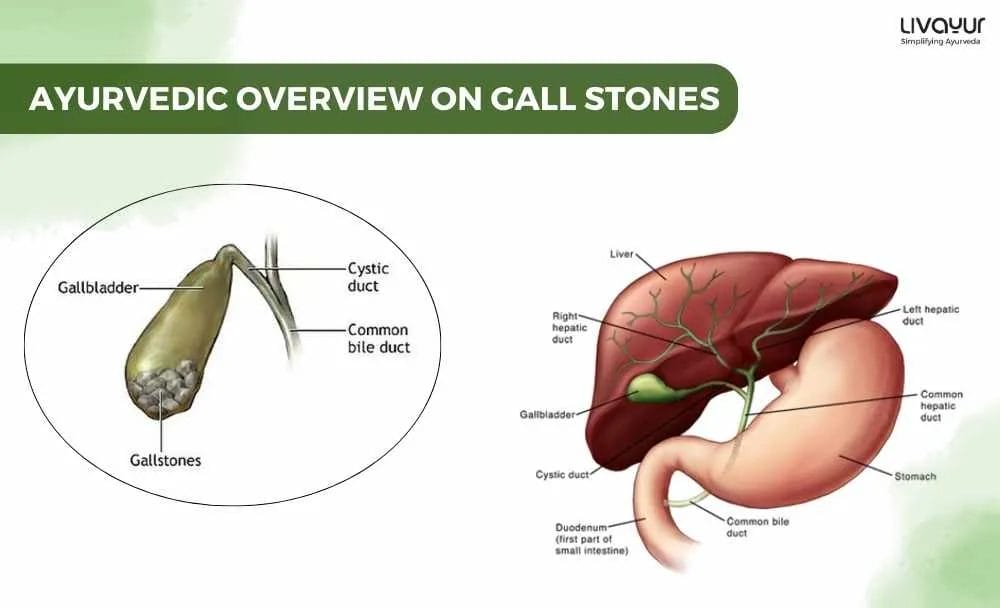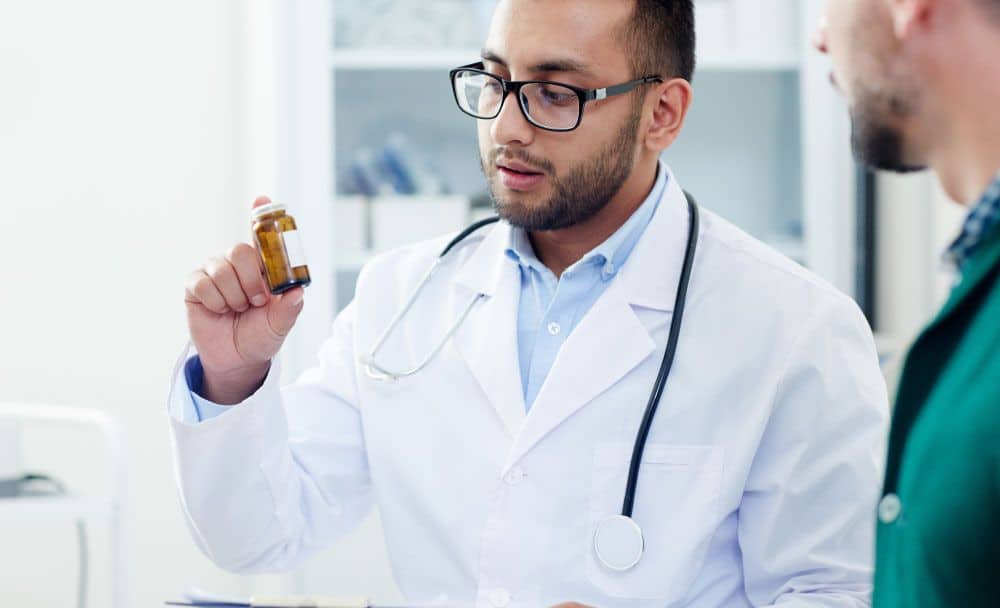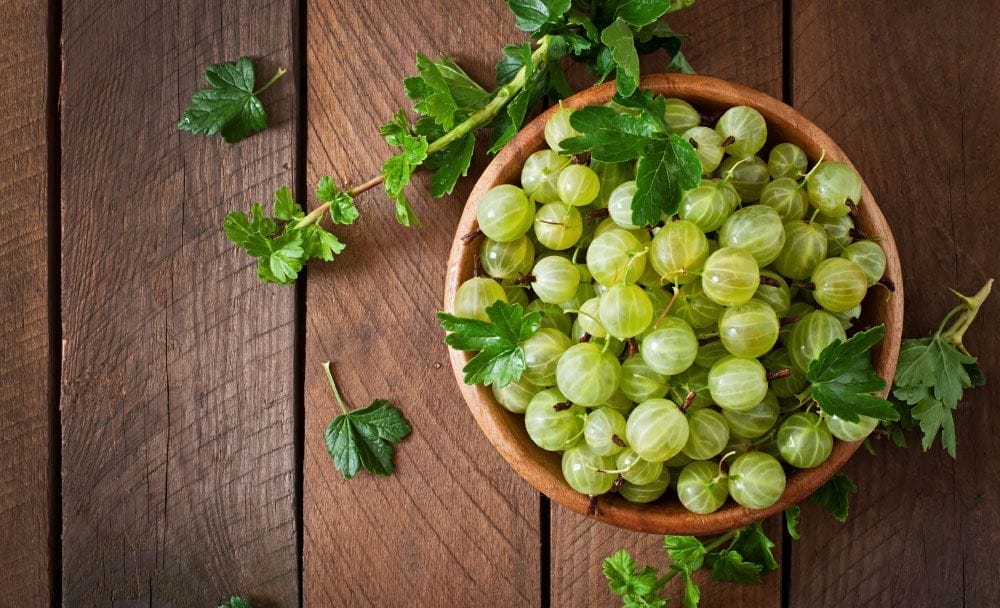Reviewed By Dr. Vipin Bihari Sharma
Gallstones or gallbladder stones are a common medical condition that affects the gallbladder, a small organ located beneath the liver. The primary function of the gallbladder is to store and concentrate bile. The syndrome is caused when the cholesterol levels in bile become too high and the excess cholesterol assumes the form of stones. Gallbladder stones are a widespread occurrence, but only a handful of people develop symptoms.[1]
These small, hardened deposits can vary in size, ranging from a grain of sand to a golf ball. While some individuals may have gallstones without experiencing any gallbladder stone symptoms, others can face significant discomfort and health complications.
This comprehensive guide will throw light on various aspects of gallstones, providing valuable insights into gallbladder stone symptoms, causes, diagnosis, and gallbladder stones treatment methods. By delving into this information, individuals can better understand their condition and make informed decisions regarding their healthcare.
What are the causes of gallstones?
According to studies, gallbladder stones are formed when there is a lack of balance in the chemical makeup of bile inside the gallbladder. The cholesterol levels in the bile often go out of proportion, so the excess cholesterol turns into stones. The condition usually develops:
- If there is cholesterol inside the gallbladder
- If there is bilirubin inside the gallbladder
- In case a person is obese or overweight
- In females, especially after they have had children
In people who have crossed the age of 40 (the risk increases with age) [1]
What are the symptoms of gallstones?
In most cases, gallstones do not show any gallbladder stone symptoms. However, a patient may experience sudden and severe abdominal pain, known as biliary colic, and the pain happens in the gallbladder stone pain area when a gallstone clogs one of the human bile ducts. Some of the common gallbladder stone symptoms include:
- Abdominal Pain or Biliary Colic: This is one of the most common gallbladder stone symptoms where there is a sudden severe pain in the gallbladder stone pain area that may last between 1 to 5 hours and is centered in the middle of the abdomen. It also occurs under the ribcage on the right-hand side, from where it spreads to the shoulder area. The pain is also often triggered after the intake of fatty foods.
- Pain in Other Body Parts: Some individuals also experience pain in the back (between the shoulder blades), combined with nausea or vomiting.
- Other Gallbladder Stone Symptoms: High temperatures, racing heartbeat, itchy skin, loss of appetite, diarrhea, chills, persistent pain, and confusion, among others. (3)
Risk Factors of Gallstones
Gallstones can be caused by a variety of lifestyle risk factors, including diet, obesity, and rapid weight loss.
- Obesity: One of the main risk factors for gallstones is obesity.
- Quick Weight Loss: Individuals who experience rapid weight loss are more likely to acquire gallstones. In actuality, one of the most significant medical side effects of deliberate weight loss is gallstones. The connection between gallstones and diets has just lately come to light.
- Dietary Practices: Dieting, according to researchers, may alter the gallbladder’s cholesterol and bile salt balance. There is a drop in bile salt content and an increase in cholesterol. Long-term fasting (such as skipping breakfast), which is a popular diet strategy, may also lessen the frequency of gallbladder contractions. Gallstones may develop if the gallbladder does not empty out the bile frequently enough.
Other Risk Factors:
Listed below are other not-so-common risk factors for gallstones:
- Age: The condition often develops in individuals who are 40 years or older
- Gender: It is more common in women than in men
- Elevated triglycerides
- Low levels of HDL (high-density lipoprotein) cholesterol
- Using medications that decrease cholesterol
- Crohn’s disease and diabetes in the terminal ileum
- Elevated estrogen levels brought on by birth control pills, hormone replacement therapy, or pregnancy
- Illness of the liver (4)
How can gallstones be diagnosed?
Since, in most cases, gallbladder stones do not manifest any symptoms, they are usually discovered when tests for conditions are conducted.
In case an individual shows symptoms of gallstones, a physician may ask for further tests like Murphy’s sign test to help determine if the gallbladder is inflamed.
A battery of blood tests may also be recommended when a patient is checked for signs of infection or if the liver is functioning properly. For instance, if there are gallbladder stones in the bile duct, it will be difficult for the liver to work properly.
In case a patient shows certain symptoms and the initial test results suggest that they have gallstones, they may be recommended to do several other tests such as:
- Ultrasound Scan: An ultrasound scan can usually confirm the presence of gallstones. The kind of ultrasound used for gallstones is akin to the scan used during pregnancies. When there are gallbladder stones in the bile duct, they are sometimes detected during an ultrasound scan. In case they are not visible but the medical examinations suggest the bile duct may be affected, some other tests may be in order
- MRI Scan: AN MRI Scan uses hyper-magnetic fields as well as radio waves to generate detailed images of the inside of the body, which may be required to detect gallstones in the bile ducts.
- Cholangiography: This is yet another procedure that can offer further information about the condition of the gallbladder. In the course of this test, if a blockage is detected, a doctor may suggest removing it immediately.
- CT Scan: This scan is usually recommended if a doctor wants to determine if any complication is involved, such as acute pancreatitis. If a patient suffers from severe abdominal gallbladder stone pain, a CT Scan is usually ordered to diagnose the cause.[1]
What is the treatment for gallstones?
Mild gallbladder stones can go without the need for any gallbladder stones treatment. Treatment is required if the patient manifests certain symptoms such as pain in the abdomen and other complications such as acute pancreatitis and jaundice. In such a situation, they usually need to go through a gallbladder stones treatment like keyhole surgery for gallbladder stone removal. The procedure, also known as a laparoscopic cholecystectomy, is relatively uncomplicated. A patient can go on leading an everyday life without a gallbladder.[1]
A patient with gallstones may also require gallbladder stones treatment if the condition creates the risk of other complications, such as:
- Diabetes
- Scarring of the liver or cirrhosis
- High blood pressure inside the liver, which is known as portal hypertension
Some patients experience mild and infrequent pain from gallbladder stones – and are usually given painkillers as primary treatment. To control future bouts, the doctor might suggest to maintain a healthy diet. Like avoiding certain foods that trigger gallbladder stones symptoms, such as fatty or spicy food that leads to diarrhea or bloating.
In case the gallbladder stones symptoms are extremely severe and frequent, a doctor will recommend gallbladder stone surgery to remove the gallbladder.[1]
The best gallbladder stone ayurvedic treatment is believed to be lifestyle modification through ahara, vihar, and achara, as well as detoxification therapies. This gallbladder stone ayurvedic treatment involves therapeutic medicated purgation after the administration of medicated oils/ghee. [2]
Among other ayurvedic medicine for gallbladder stone are amalaki rasayana and trivrittavalehyam, which are potent anti-oxidants and are also known to pose anti-inflammatory activities. Amalaki and Rasayana are the best anti-oxidants with hepato-protective and anti-inflammatory properties.[2]
A healthy and balanced diet is suggested if a patient is advised against gallbladder stone surgery or removal. This usually involves keeping a variety of food in the diet, which also includes moderate amounts of fat and comprises regular meals. While this will not cure gallstones completely or make the symptoms go away, it will certainly bring big improvements in general health and help keep the pain that is induced by gallstones under control.[1]
Prevention of Gallstones
Maintaining a nutritious diet can help reduce your risk of gallstones. The following measures are advised by experts to help prevent gallstones:
- Increase your intake of high-fiber foods such as fruits, vegetables, beans, and peas.
- entire grains, such as whole wheat bread, oats, and brown rice.
- Consume less sugar and refined carbs.
- Consume heart-healthy fats, such as olive and fish oils, to support proper gallbladder contraction and emptying.
- Steer clear of bad fats, which are frequently found in fried and dessert meals.
When to See A Doctor
Make an appointment with your doctor if you experience any symptoms that you think could be indicative of gallstones, such as persistent stomach pain, severe pain with fever and chills, or yellowing of the skin or eyes.
Conclusion
In this article, we explored the different signs and symptoms associated with gallbladder stones, ranging from mild digestive disturbances to severe abdominal pain. We have also delved into what is gallbladder stone, how gallbladder stones are formed, and the underlying causes of gallstones, including factors such as cholesterol imbalance, excess bilirubin, and gallbladder motility issues. Furthermore, we have looked at the diagnostic methods employed by healthcare professionals to identify gallstones accurately, such as ultrasound imaging and blood tests. In addition, various approaches, ranging from gallbladder stone ayurvedic treatment, lifestyle modifications, and dietary changes to medical interventions and surgical procedures, can help deal with gallstones easily.
FAQs
- What are the complications that can arise if you have gallstones?
In the case of gallbladder inflammation, also known as acute cholecystitis, there may be severe gallbladder stone pain in the upper abdomen, very high temperature, and rapid heartbeat. In such a situation, a patient may have to be given intravenous antibiotics or advised surgery to get rid of a section of the lining that is severely damaged. Other complications that may arise are jaundice, infection of the bile ducts, acute pancreatitis, gallstone ileus, or even gallbladder cancer.
- What kind of food should be avoided if you have gallstones?
If you have gallstones, it is advised that you avoid eating too many foods with a high saturated fat content. These could be food items such as meat pies, sausages and fatty meat cuts, lard, ghee, butter, hard cheeses, cream, cakes and biscuits, and food that contain coconut oil and palm oil. The best gallbladder stone home remedy is thus keeping your food habits in check.
- Is being overweight a cause of gallstones?
Since the amount of cholesterol in the bile increases the risk of developing gallstones, controlling weight through a healthy diet and regular exercise is essential.
Disclaimer
This article is written from a health and wellness perspective only and is not medical advice. Kindly seek the help of a certified medical practitioner before initiating any treatment.
References
- Overview-Gallstones
- Management of acute calculus cholecystitis with integrated Ayurveda and Yoga intervention: A case report
- https://www.mayoclinic.org/diseases-conditions/gallstones/symptoms-causes/syc-20354214#symptoms
- https://www.nhs.uk/conditions/gallstones/prevention/#:~:text=A%20healthy%2C%20balanced%20diet%20is,your%20risk%20of%20developing%20gallstones.
- https://www.thelancet.com/journals/lancet/article/PIIS0140-6736(05)77083-5/fulltext



















